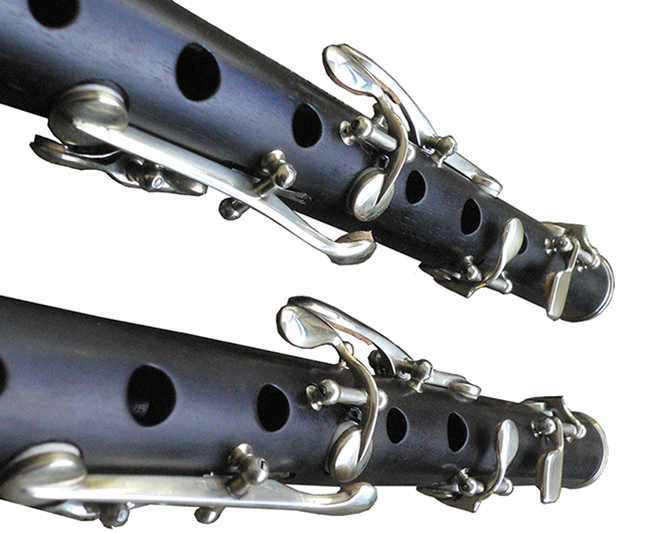Simple system 6 keyed Flute in G - the so-called Bass Piccolo * - designed for playing the new harmony lines now being added to the scores of the Basler Fasnachts Märsche (drum and piccolo marches of the Carnival of Basel). The Basler Fasnachts Piccolo itself is essentially the small version of a simple system flute, tuned one octave above the flute. The Bass is a fourth above the D flute and a fifth below the piccolo, and it has a range of nearly three octaves. For the names of notes and keys of this G flute, it appears conveniant to use the terms in D, as connected with piccolos and wooden flutes, rather than the true pitches (and it is done so in the comment below).
* (Yes, we know, it should rather be “Alto“. Nevertheless, the instrument is originally meant for playing the bass lines, hence, the term “Bass“ has been adopted naturally.)



Standard Version
Rings and pin-mounted keys in nickelsilver, tuning slide, kork with a tuning thread, large finger holes
Wood
African Blackwood
Tone and Response
Big and rich tone, excellent tuning. One Bass instrument is powerful enough to carry the bass line in a group of up to 10 piccolo players.
Options
Outdoor version in black plastic (not Delrin). There is hardly any difference in tone to the standard wooden version. Available too: Version for Basler Fasnachts Piccolo high F fingering (see below)

Notes on Fingering
The Bass Piccolo's fingerings are essentially the same as for a simple system flute with large finger holes. However, there is a difference to some of the fingerings commonly used on the Basler Fasnachts Piccolo. The shapes concerned are those for high F and F sharp:
- As opposed to a standard Basler Fasnachts Piccolo, the regular version Bass Piccolo has in-tune F sharps. However, this is at the expense of the baroque shape fingering for high F generally used on the Fasnachts Piccolo. On the other hand, normal flute fingerings have better sound, respond and intonation – and not just on the “Bass“.
- The fingering for high F sharp commonly taught on the Basler Piccolo produces a very sharp note on any type of flute. It shouldn't be used (except in fast runs) and standard wooden flute fingerings are recommended instead, on either the Fasnachts Piccolo or the “Bass“.
At request I make a version for the use of the old high F fingering, with F sharps tuned flat in the lower octaves (press an F key when playing F sharp just like it is now done on the piccolo, too!).
You can download a fingering chart here.
Scores for the Bass Piccolo
quite a few newly composed bass lines are available already:
Cornelius Buser (This email address is being protected from spambots. You need JavaScript enabled to view it.)
- Calvados (all transposed – non transposed at request)
- 3 Värs
- Stäpfeli
- My Lady... (enthält „en Allemande“ von Dowland, „Mignonne“ und „Autigne“)
- Sof Sof
- Nordliecht
Beery Batschelet
- Slow Beery Slow
- Sodeli (im Verkauf)
- Husar (im Verkauf)
- Bäreblues (im Verkauf)
- Narrarabaschi
- Lumpesammler
- Gazpacho
- Saggodo
- Zigüner
Sebastian Meyer
- Andreesemärt (available from: This email address is being protected from spambots. You need JavaScript enabled to view it.)
Tobias Scheuring
Chihiro (für ein Piccolo & zwei „Bässe“) (not transposed – transposition availbable from: This email address is being protected from spambots. You need JavaScript enabled to view it.)
Stephan Trüeb
- Tiger Rag (transposed and non transposed)
You can download a list of compositions here.
The information on this page can also been downloaded in French.
Fizzè Mensch
- Fuudyblutt (3. & 4. Stimme)
- Schnuurepflutteri (Bass-Picc.& Spez Stimmen)
- Troubadour (4. Stimme)
- Festival (3. Stimme)
- Monti (3. Stimme)
all available from Fizzè This email address is being protected from spambots. You need JavaScript enabled to view it.
Additional tunings are:
- Wettstai 16 (added mid part, bass line and a special high pitched harmony line)
- Mord am Drummeli (Miss-Marple-Arrangement, comprising new bass line)
- "Giaglia-Pinocchio" (transposed, with bass line)
- "Big-Top" (transposed, with bass line)
- Bass line for the "Brandenburger Märsche)
- Bass line for "d Veegel"
Author: Tobias Scheuring



